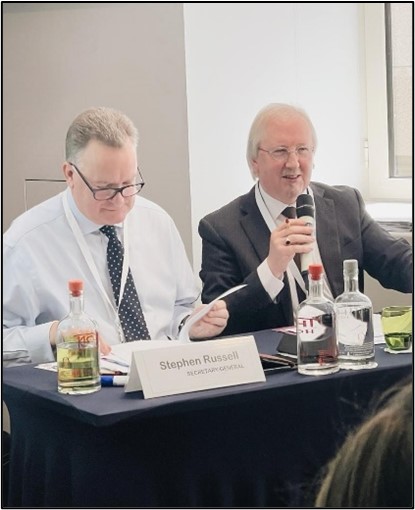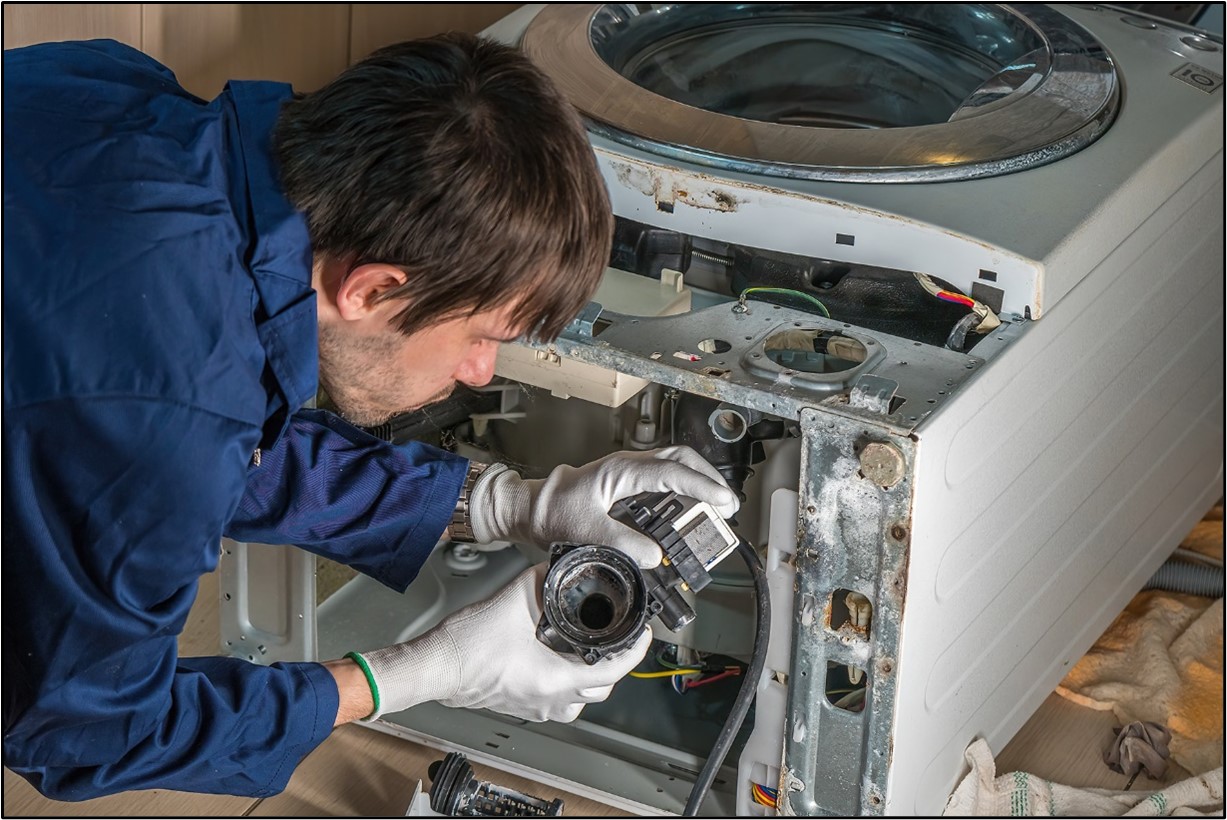Lead story
ANEC General Assembly meets
The 33rd meeting of the ANEC General Assembly (ANEC/GA) was held on 14 & 15 June 2022 as a face-to-face meeting in Brussels. The meeting saw participation of members from most countries, as well the participation of several Chairs of our Working Groups. ANEC President, Dermott Jewell, extended a very warm welcome to the first face-to-face meeting of the GA for three years.
During the first day, the accounts for 2021 were adopted with a progress report on execution of the budget 2022. Although there were no deviations from forecast expenditure in the first quarter of 2022, ANEC Secretary-General, Stephen Russell, noted the risk posed by escalating inflation in Belgium. Although many other European countries were also seeing inflationary pressures, he warned that the legal requirement in Belgium to index-link salaries was an added weight on employers, and ANEC was no exception. Members then heard an update on diversification of the budget. A review of political developments followed, with a focus on the EU Standardisation Strategy of 2 February 2022.
Noting the emphasis of the Standardisation Strategy on inclusiveness, members engaged in what proved a lively debate on their expectations from “inclusiveness in standardisation”. The conclusions will form part of the ANEC contribution to the related considerations in CEN-CENELEC and ETSI. The day ended with an overview of developments in the fields of Child Safety and Domestic Appliances.
Following the EGM (below), further briefings to members addressed the fields of Accessibility & Digital Society, Mobility & Resource Efficiency, Sustainability, Services and Ecodesign, as well as the PROMPT project, a programme to define ways to avoid the pre-obsolescence of products. Particular focus was placed on elements where the support of members is needed to advocate the ANEC position to public authorities and national standardisation bodies.


ANEC Annual Review 2021
The General Assembly welcomed the Annual Review 2021 as a record of the activities and successes of the association, in a year still dominated by the pandemic. During 2021, ANEC participated in 568 meetings and sent no fewer than 551 sets of written comments on draft standards, as well as 62 Opinions to CEN-CENELEC on standards under vote.
In applauding the achievements of the association during a testing year, ANEC President Dermott Jewell said,“… as the trusted voice of the European consumer in standardisation, ANEC will be an influencing agent in the strategic considerations and actions that we must recommence in looking forward to 2030 and beyond”.
The Annual Review can be downloaded at https://bit.ly/ANEC_AR2021.
New ANEC Statutes
The second day of the ANEC/GA meeting was preceded by an Extraordinary General Meeting (EGM) of the Association to adopt new Statutes. Aimed at strengthening the governance of ANEC, the new Statutes also ensure compliance with the Belgian Companies & Associations Code of May 2019.

Most visibly, the Statutes change the legal title of ANEC to the European Consumer Voice in Standardisation, a title used informally in recent years. Another visible modification changes the lead executive to a Director-General, with legal responsibility for the day-to-day affairs of the association. The adoption of the Statues took place in the presence of notary public, Frédéric de Grave.
In welcoming adoption of the Statutes, President Dermott Jewell thanked the ANEC Steering Committee members for helping guide their drafting, as well as EY Law for their professional advice.
Horizontal
EU-US TTC WG1 Stakeholder Workshop
ANEC was honoured to be a speaker at a EU-US TTC WG1 Joint Stakeholder Workshop that took place on 6 May. The workshop focused on best practices for stakeholder engagement, in particular the involvement of SMEs, start-ups, academics and civil society in standards development.

In the context of the EC proposal for a Regulation on AI, we welcomed the political support the European co-regulators (the Council and Parliament) are giving to participation of all stakeholders, including civil society, in the standardisation process.
We noted too the continuing expectations of the EC for European Standardisation to become more inclusive, as reflected in the Standardisation Strategy. Indeed, a systematic approach to inclusiveness helps connect the dots between trade discussions and standards. This is something ANEC has foreseen for many years and is now taking shape.
It is particularly important in the digital sector where standards must reflect our democratic foundation and principles. One way is to introduce values and principles in the design of products and services (e.g. privacy by design), with standards being a tool to achieve this.
We concluded with the view that WG 1 should be strategically looking at the principle of the primacy of international standardisation over the regional in the context of standards for emerging technologies, especially when these have impact on fundamental or human rights. We also said WG1 should also be examining different Standards Development Organisations on how they implement inclusiveness (e.g. can consumer experts participate in an easy and affordable way? Are public authorities active? If not, why not? Is the process dominated by certain (big) players?).
Child Safety
ANEC acts for better toy safety
ANEC welcomed the opportunity to put forward the consumer perspective at a Stakeholder Workshop on revision of the Toy Safety Directive (TSD), hosted by DG GROW on 26 April. Although the present TSD has ensured greater safety for children from the risks posed by toys, it is now out-dated and inadequate, especially in respect of protection from chemicals in toys.
The workshop looked at the problems behind toy safety, the shortcomings and the options to improve compliance and enforcement. With our long-standing expertise in toy safety, we were pleased to contribute to the discussion. Following the workshop, we submitted our reply to the EC Public Consultation on the TSD revision on 23 May (https://bit.ly/3xyLs02).
The revised TSD aims to be current for the next 15 years and be flexible enough to tackle new challenges. An impact assessment study is being carried out and will be delivered to the EC in October 2022.
Similarly, we were also pleased to be invited to speak and present our expert opinion on the TSD to the Steering Committee of the TIC (Testing, Inspection and Certification) Council on 31 May. Child safety is a key priority for ANEC and we will continue to advocate for better toy safety legislation, more stringent testing and improved standards.

Public Consultation on the TSD
As noted above, we welcomed the opportunity to reply to the EC Public Consultation on the targeted revision of the Toy Safety Directive (TSD) in May 2022 (https://bit.ly/3HMvFiT).
We want to see significant improvements in toy safety for all children and support the TSD being replaced by a Regulation which would have direct legal effect in Member States, so ensuring consistency across the EU market.
In brief, we call calling for:
- More stringent chemical requirements for children of all age ranges
- Bans on certain categories of chemicals and harmful substances in toys
- Establishment of positive lists of authorised substances and content labelling
- Better hearing protection through tougher acoustic toy noise levels
- Further cybersecurity and privacy requirements throughout the lifetime of connected toys
- Improved visibility & legibility of warnings
- Moving the misleading CE marking to the technical file of the product.
- Creation of a pan-European accident and injury database
- Improved compliance and enforcement, and stronger market surveillance
- Flexibility to adapt the legislation to new risks or market evolution
Regarding the risk management for chemicals in toys, we recommend a generic approach (i.e. to ban certain categories of chemicals, rather than individual substances. To achieve this, we believe it important to broaden the scope of Article 46 of the TSD.
Following the dictum, “the higher the risk, the higher the conformity assessment procedure”, we favour introducing a provision to require pre-market EC-type examination (independent third-party testing and certification) for certain categories of toys. This principle is applied for the PPE and Medical Devices Regulations.

Accessibility
ANEC Accessibility WG meets
The ANEC Accessibility WG met on 10 May 2022. The meeting discussed the accessibility of lifts, access to the information society by older persons and persons with disabilities, access and usability of the built environment, and eAccessibility.
Specific issues included revision of EN 301549 ‘Accessibility requirements for ICT products and services’ under the EAA request; our comments on the Standardisation Request (SReq) under the EAA; the revision of EN 17210 ‘Accessibility and usability of the built environment - Functional requirements’ and our comments on ISO WD 5727 ‘Accessibility of Immovable Cultural Heritage – General criteria and methodology’.
Last, but not least, a presentation was made by CEN-CENELEC on the EAA SReq and work of CEN/BT WG 213 SAGA.

ANEC speaks on accessibility and inclusion
On 2 June, ANEC’s Chiara Giovannini spoke in the panel discussion, ‘Cognitive accessibility – the key to broader outreach?’ The discussion reflected the needs of people with cognitive disabilities not being sufficiently addressed, as confirmed by an EC study presented at the event (https://bit.ly/39qxghP).

We shared our experience, starting in 2012, about the identification of the functional needs of persons with learning disabilities (dyslexia, dementia, other cognitive disabilities) when using mobile ICT devices. This led to development of ETSI TR 103 349, ‘Functional needs of people with cognitive disabilities when using mobile ICT devices’, and ETSI Guide 203 350, ‘Guidelines for the design of mobile ICT devices and their related applications for people with cognitive disabilities’. Both standards were published in 2016.
We also contributed to ISO 21801-1 ‘General Guidelines on Cognitive Accessibility’ and ISO 21802 ‘Assistive products – guidelines on cognitive accessibility – Daily time’, and work on ISO 21801-2 ‘Reporting the Cognitive Accessibility of Products and Technologies’. We think this last standard will be especially relevant at European level. Indeed, we plan to investigate adding requirements on cognitive user needs to EN 301 549 on digital accessibility.
The panel concluded that digital technologies could be very helpful for people with cognitive disabilities, as long as the user interfaces are designed to be accessible.
Domestic Appliances & Sustainability
Meeting of EEPLIANT3 Advisory Board
The EEPLIANT3 (Energy Efficiency Compliant Products 2018) project is a pan-EU concerted action on market surveillance that aims to achieve impacts in line with the objectives of the Horizon 2020 Work Programme on Secure, Clean and Efficient Energy. The action is funded by the EU, started in June 2019 and will run until May 2023. EEPLIANT3 will help deliver the intended economic and environmental benefits of the framework Regulation for Energy Labelling 2017/1369 and Ecodesign Directive 2009/125 by increasing rates of compliance.
ANEC supports joint market surveillance actions, as legislation and standards are of no value to consumer protection if not enforced. We were pleased to join the EEPLIANT3 3rd Advisory Board meeting on 24 May 2022. We commended the good work being done to support market surveillance authorities (MSAs) with IT tools, collaboration with customs, centres of excellence test laboratories, tailor-made training and cooperation with non-EU countries. There are still many non-compliant products on the market, which shows the importance of the continuation of EEPLIANT3’s project.
We especially value the centres of excellence test laboratories. It is important laboratories have the competence to investigate the technical details when they assess a certain method. If not, misleading certificates may result.

Participants discussed the preliminary results obtained from inspections and testing of air conditioners, comfort fans, household tumble dryers, water heaters, hot water storage tanks, ventilations units, light sources and local space heaters.
Sustainability
PROMPT standardisation workshop
On 9 May, ANEC brought together standardisation experts and members of the PROMPT project consortium to discuss material efficiency standards. PROMPT is researching ways to extend the lifetime of products, and is also developing product-specific testing programmes that identify criteria considered key to product durability. Such an understanding will inform standardisation work aiming to develop product-specific durability standards.
The event was opened by ANEC Secretary-General, Stephen Russell, who used the example of ANEC’s work in revising the European standards for domestic appliances as evidence of where consumer pressure and standardisation can change a market where literally millions of products are sold annually. He highlighted the importance of longer lasting products to consumers, and need for standards for the introduction of sustainability requirements in the field of product design. With work starting on the horizontal level in CEN and CENELEC, it was time to bridge the gap in product-specific standards, something PROMPT can aid.

The Chairs of CENELEC TC59X WG23 presented the work done so far in development of a durability standard for washing machines. The ANEC expert in WG23 stressed the need to develop a robust methodology, as the standard will set a precedent for the product-specific standards that will follow. PROMPT representatives presented the work done so far regarding the development of a testing programme for washing machines.
Bridges were built during the workshop, as CENELEC TC 59X WG23 has now invited PROMPT members to participate in future meetings. ANEC will continue to participate in both WG23 and PROMPT to ensure a fruitful cooperation, and advance the development of product-specific standards for Ecodesign.
PROMPT holds 6th General Assembly
From 8-10 June 2022, the PROMPT (https://bit.ly/3OkdXpe) consortium held its 6th General Assembly. Partners presented the latest findings from the project regarding product design (https://bit.ly/3N0ZwoO) and consumer data (https://bit.ly/3zGr2or).

PROMPT has developed a draft testing programme to assess the longevity of smartphones, TVs, washing machines and vacuum cleaners, looking at a) how likely a product will fail; b) how easy it would be to repair it and c) how likely it is that consumers will retain the product instead of replacing it. The testing protocol is being assessed by independent laboratories in Europe and the first results are becoming available.
Digital Society
Final agreement on common charger
As the European Commissioner, Thierry Breton, said on 7 June during a press event, “It is a great day for consumers and the environment”. ANEC could not put it better. We applaud the final agreement on the common charger for mobile phones and other devices (revised Radio Equipment Directive) reached among the European Parliament, the Council and EC. Moreover, the agreement reflects ANEC’s position on common chargers, one we have urged since 2009. The USB Type-C port will be mandatory for portable devices, and harmonisation of wireless charging will be achieved in the future.
The EU institutions enlarged the scope of the EC proposal to include handheld videogame consoles, keyboards, portable speakers, portable navigations, digital cameras, tablets and earbuds. Laptops will also have to be adapted to the requirements by 40 months after the entry into force of the revised Directive. The agreement also includes the provision of clear information and labelling on new devices about charging options, as well as whether a product includes a charger, following requirements on “unbundling”. In the future, after an assessment by the Commission, unbundling could become the default.

A further goal of the agreement is to avoid new fragmentation in the market by asking the European Standardisation Organisations to draft Harmonised Standards on wireless charging.
The revised Directive will enter into force 20 days after publication in the Official Journal, and its provisions will start to apply after 24 months.
Hague Conference on Responsible AI
ANEC was delighted to be a speaker at the Hague Conference on Responsible AI, which took place 12-13 May 2022.
Chiara Giovannini presented our views on the AI Act during the session, ‘Transforming ethical norms into standards that help organizations and developers create responsible AI’. We want the European standards for AI to address European values and fundamental rights, and not identical adoptions of International Standards that may not reflect European values and principles.

We call for increased inclusiveness of the standardisation process in order for consumers of all ages and abilities to be able to participate effectively in the development of standards. As standards will play an important role in detailing the essential requirements listed in the Act, the governance system of the standardisation process must be changed significantly, in line with the expectations of the EU Standardisation Strategy. Consumer organisations need to be systematically involved in standardisation, and public authorities must provide the political and financial frameworks required to allow the participation of all stakeholders, including consumers and broader societal interests.
Moreover, standards can be used (and are used) to determine the safety and performance requirements of a fridge or an oven in terms of surface temperature or energy use. The performance and outcome of an AI system depend not only on its technical components, but decisions about who uses the technology, for what purpose and in what context. These decisions have the potential to impact fundamental rights.
Chiara ended by noting that the perceived and real asymmetries between consumers and businesses in AI have to be addressed by European policy. If not, consumer vulnerabilities and distrust will increase, and the sense of disempowerment of citizens too.
Conference on the EU Cybersecurity Act
ANEC took part in the panel, ‘Bringing the Cybersecurity Act and Technology Together’ at the 2022 International Conference on the EU Cybersecurity Act which was held in Brussels on 24 & 25 May. The Conference has been established to aid the standards community when developing risk-based frameworks focused on tackling market fragmentation in the EU.
Regarding the questions of how adoption of the EU Cybersecurity Act can be speeded up, and how can we work together efficiently and pragmatically, ANEC said the focus now needs to be on mandatory cybersecurity requirements and linked standards (RED delegated act, future CRA). Concerning the common baseline requirements, we said it is difficult to see the effects of the IoT standard ETSI 303 645 on the market. It strengthens our doubts about voluntary approaches. We need to have a high level of cyber-protection in line with the high level of consumer protection stated in the EU Treaties. These requirements should include at least encryption, software updates and strong authentication methods. Moreover, safety legislation and standards must be updated to ensure they are in line with the new ‘security for safety or cyber-safety’ concept of the general legal framework.
We rounded up the discussion by concluding that a more European approach by European decision-makers and companies would help achieve a digitally-sovereign Europe.

Services
ANEC Services WG meets
The annual meeting of the ANEC Services WG was held virtually on 11 and 12 May.
On 11 May, our experts discussed activities on horizontal and inclusive services, fire safety, citizen security, and tourism services. Participants also heard about ANEC’s involvement in the EPC Scheme End-User Multi-Stakeholder Group and ISO TC 322 on sustainable finance.

On 12 May, DG SANTE updated experts as regards the evaluation report on application of the directive on Patient Rights in Cross-Border Healthcare (https://bit.ly/3N4wlBu), which was published the same day (below). A BEUC colleague also joined us to present the latest on the Digital Services Act. Discussions moved on to our work on standards for e-commerce and sharing economy; healthcare-related standards, the opportunities and risks from digital health, and how AI is transforming health services.
Cross-Border Healthcare – evaluation report
On 12 May, DG SANTE published its evaluation report on the application of the directive on Patient Rights in Cross-Border Healthcare (https://bit.ly/3xUFmII).

The report (https://bit.ly/3HuIxKv) features an annex on follow-up actions to enhance the implementation of the Directive (https://bit.ly/3mTyEfU). It highlights that the directive has ensured the equal treatment of all EU patients when treated in any other EU country, and it has provided for partial or full reimbursement of cross-border healthcare costs. It adds that challenges are still faced by consumers when seeking healthcare abroad, mainly due to the uneven application of directive by EU countries, burdensome administrative procedures and overly complex information on the best cross-border healthcare options available.
Its findings are broadly in line with our own conclusions on cross border healthcare and our recent positions (https://bit.ly/3xTrnTw, https://bit.ly/3mQ4sSQ).
Chemicals
REACH revision
ANEC replied to the EC consultation on the targeted revision of the REACH Regulation ((EC) 1907/2006 in April (https://bit.ly/3NWUHyb). We repeated the importance to consider the shortcomings of the tool for consumer protection, as described in our position paper in reply to the IIA Roadmap (https://bit.ly/3HtNpQ0).
The targeted revision seems the main route chosen by the Commission for now. Still, we continue also calling for a consistent approach to address chemicals in all consumer-relevant product legislation, rather than limiting it to an improved restriction procedure. In that way the regulatory frameworks vis-à-vis REACH could be assessed comprehensively.
In principle, we strongly agree with the application of the essential use concept to increase protection against the most harmful chemicals. It is important to note that, for this concept to be useful, it is essential that clear and scientific criteria are developed to define the only instances the use of certain harmful chemicals can be allowed.
We also make recommendations on Generic Risk Assessment and the sustainable by design concept, and highlight the limitations of LCA methods to assess chemicals in products.

Traffic & Mobility
Towards decarbonising European roads
On 8 June, the European Parliament took a historical step by voting to phase out new cars and vans with internal combustion engines by 2035. In practice, manufacturers will have to cut the average fleet emissions for new cars and vans progressively (15% by 2025 and 55% by 2035, compared with 2021), until these vehicles reach zero net emissions by 2035.
ANEC has been following this key legislation from the Fit for 55 Package, as it represents a notable step forward for the climate and consumers. A study conducted by BEUC has shown that electric cars are already the most financially-interesting option for many consumers. Ramping up the production of electric vehicles in order to reach zero emissions by 2035 will make them more affordable for more drivers in Europe, which in turn will aid governments fulfil their climate pledges. Consumers will also benefit from an improved air quality which will reduce health-related problems that affect thousands of Europeans every year.
See our position paper, ‘Sustainable transport and mobility in the context of European standards’ for an in-depth review of this topic (https://bit.ly/39rDbTE).

News from ANEC member countries
Denmark
The Danish Consumer Council THINK Chemicals has reviewed the ingredients in sunscreens, and stretch mark creams and oils for pregnant women.
One in three sunscreens contained suspected endocrine disrupters which can be problematic in products due to the cocktail-effect – a term given to combined exposures of problematic chemicals from different sources. It is better to choose a sunscreen without these chemicals. For details of the tests, go to https://bit.ly/3HwcQ3C.
Similarly, 2 of 13 creams and oils for pregnant women tested contained suspected endocrine disrupters. Although users are encouraged to use these creams and lotions daily, the more frequent use leads to higher risk of exposure to problematic chemicals. For details of the tests go to https://bit.ly/3MVjPEi.

| List of meetings 2021 |
For comments or if you wish to write an article for the ANEC Newsletter, please contact: Marijana ANTAROROVA (This email address is being protected from spambots. You need JavaScript enabled to view it.).



